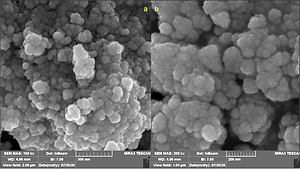Current issue
Archive
Manuscripts accepted
About the Journal
Editorial office
Editorial board
Section Editors
Abstracting and indexing
Subscription
Contact
Ethical standards and procedures
Most read articles
Instructions for authors
Article Processing Charge (APC)
Regulations of paying article processing charge (APC)
BIOCHEMISTRY / RESEARCH PAPER
Calendula officinalis green-mediated silver nanoparticles: formulation, characterization and assessment of colorectal cancer activities
1
Department of General Surgery, Affiliated Cancer Hospital of Zhengzhou University, Zhengzhou, Henan, China
2
Department of Chemistry, Faculty of Science, Hakim Sabzevari University, Sabzevar, Iran
3
Biotechnology and Medicinal Plants Research Center, Ilam University of Medical Sciences, Ilam, Iran
Submission date: 2021-08-14
Final revision date: 2021-09-10
Acceptance date: 2021-09-17
Online publication date: 2021-10-15
Corresponding author
Behnam Mahdavi
Department of Chemistry, Faculty of Science, Hakim Sabzevari University, 96179-76487 Sabzevar, Iran, Iran
Department of Chemistry, Faculty of Science, Hakim Sabzevari University, 96179-76487 Sabzevar, Iran, Iran
KEYWORDS
Calendula officinalissilver nanoparticlesgreen synthesisantioxidantanti-human colorectal cancercytotoxicity
TOPICS
ABSTRACT
Introduction:
The biosynthesis of metal nanoparticles using medicinal plants is not only economical but also environmentally friendly as well as having miscellaneous biomedical applications.
Material and methods:
In the present study, silver nanoparticles were green-synthesized using an aqueous extract of Calendula officinalis. The synthesized AgNPs@C. officinalis was characterized by analytical techniques including EDX, FE-SEM, XRD, UV-Vis., and FT-IR. The anti-human colorectal cancer activities of AgNPs@C. officinalis were evaluated using MTT assay. The nanoparticles were formed in a spherical shape in the range of 38.05 to 75.41 nm for the particle size. On the other hand, the MTT assay was run to evaluate anti colorectal cancer activity of AgNPs@C. officinalis. In the cellular and molecular part of the study, the cells treated with AgNPs@C. officinalis were assessed by MTT assay for 48 h to determine the cytotoxicity and anti-human colorectal carcinoma properties on normal (HUVEC) and colorectal carcinoma cell lines, i.e. WiDr, SW1417 [SW-1417], and DLD-1.
Results:
In the antioxidant test, the IC50 values of AgNPs@C. officinalis and BHT against DPPH free radicals were 222 and 124 µg/ml, respectively. The viability of the malignant colorectal cell line decreased dose-dependently in the presence of AgNPs@C. officinalis. The IC50 values of AgNPs@C. officinalis were 430, 326, and 392 µg/ml against WiDr, SW1417 [SW-1417], and DLD-1 cell lines, respectively.
Conclusions:
After the clinical study, silver nanoparticles containing C. officinalis leaf aqueous extract may be used to formulate a new chemotherapeutic drug or supplement to treat several types of human colorectal carcinoma.
The biosynthesis of metal nanoparticles using medicinal plants is not only economical but also environmentally friendly as well as having miscellaneous biomedical applications.
Material and methods:
In the present study, silver nanoparticles were green-synthesized using an aqueous extract of Calendula officinalis. The synthesized AgNPs@C. officinalis was characterized by analytical techniques including EDX, FE-SEM, XRD, UV-Vis., and FT-IR. The anti-human colorectal cancer activities of AgNPs@C. officinalis were evaluated using MTT assay. The nanoparticles were formed in a spherical shape in the range of 38.05 to 75.41 nm for the particle size. On the other hand, the MTT assay was run to evaluate anti colorectal cancer activity of AgNPs@C. officinalis. In the cellular and molecular part of the study, the cells treated with AgNPs@C. officinalis were assessed by MTT assay for 48 h to determine the cytotoxicity and anti-human colorectal carcinoma properties on normal (HUVEC) and colorectal carcinoma cell lines, i.e. WiDr, SW1417 [SW-1417], and DLD-1.
Results:
In the antioxidant test, the IC50 values of AgNPs@C. officinalis and BHT against DPPH free radicals were 222 and 124 µg/ml, respectively. The viability of the malignant colorectal cell line decreased dose-dependently in the presence of AgNPs@C. officinalis. The IC50 values of AgNPs@C. officinalis were 430, 326, and 392 µg/ml against WiDr, SW1417 [SW-1417], and DLD-1 cell lines, respectively.
Conclusions:
After the clinical study, silver nanoparticles containing C. officinalis leaf aqueous extract may be used to formulate a new chemotherapeutic drug or supplement to treat several types of human colorectal carcinoma.
Share
RELATED ARTICLE
We process personal data collected when visiting the website. The function of obtaining information about users and their behavior is carried out by voluntarily entered information in forms and saving cookies in end devices. Data, including cookies, are used to provide services, improve the user experience and to analyze the traffic in accordance with the Privacy policy. Data are also collected and processed by Google Analytics tool (more).
You can change cookies settings in your browser. Restricted use of cookies in the browser configuration may affect some functionalities of the website.
You can change cookies settings in your browser. Restricted use of cookies in the browser configuration may affect some functionalities of the website.



